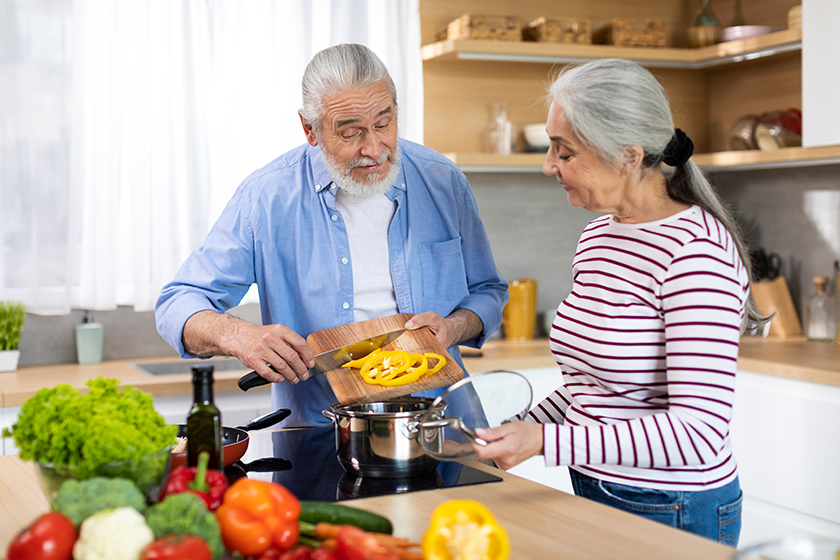Cooking is more than just preparing meals; it is a therapeutic, creative and empowering activity. For older adults, cooking offers an opportunity to stay engaged, maintain independence and create nutritious meals tailored to their preferences.
The act of preparing food can spark joy and bring a sense of accomplishment. This reminds us all of the simple pleasures of life. In this article, we will explore key culinary skills that residents can try and make their time in the kitchen both enjoyable and rewarding.
The Benefits of Cooking Later in Life
Cooking offers a multitude of benefits for residents. It encourages mental stimulation by learning new recipes and techniques. For some, it becomes a way to connect with memories, recreating meals from their past or sharing recipes with loved ones. Physically, cooking keeps the hands active, supporting dexterity and coordination. Moreover, the ability to prepare meals guarantees better control over dietary choices, promoting overall health and well-being.
The following culinary skills can help residents rediscover the joy of cooking while fostering creativity and confidence.
Learning Basic Knife Skills
A good meal starts with preparation, and mastering knife skills is fundamental. Residents can begin with simple techniques, such as chopping vegetables, slicing fruits or dicing onions. A well-sharpened knife and the right cutting board make all the difference in guaranteeing safety and ease. Over time, these skills enhance efficiency in the kitchen, reducing the effort needed to prepare meals. For added safety, adaptive tools, like cut-resistant gloves, can provide extra peace of mind.
Exploring Nutrient-Preserving Cooking Methods
Cooking doesn’t have to be complicated to be healthy. Methods like steaming, roasting and baking not only bring out the natural flavors of ingredients but also preserve key nutrients.
For instance, steaming vegetables makes sure they retain their vitamins, while baking fish with herbs infuses it with rich flavors. These methods are simple, effective and ideal for those looking to maintain a balanced diet without overexertion in the kitchen.
Experimenting With Herbs and Spices
Cooking is an art, and herbs and spices are the paintbrushes that add color to a blank canvas. Residents can experiment with combining flavors—like pairing basil with tomatoes or cinnamon with apples.
Exploring these natural seasonings not only enhances the taste of meals but also reduces reliance on salt and benefits overall health. For those new to spices, starting with a small selection and gradually expanding their repertoire can be a delightful journey.
Making Homemade Stocks and Sauces
There is something deeply satisfying about creating a rich stock or a flavorful sauce from scratch. Residents can try simmering chicken bones and vegetables to make a nourishing broth, perfect for soups or stews.
These homemade creations can be customized to personal tastes and dietary needs. This makes every dish uniquely theirs. This skill also reduces dependence on store-bought alternatives, which may be high in sodium or preservatives.
Discovering the Joy of Simple Baking
Baking isn’t just about desserts—it’s a versatile skill that opens the door to wholesome bread, savory pies and even healthy snacks. Individuals can begin with simple recipes like banana bread or oatmeal cookies. Baking is a tactile, sensory experience that allows them to knead dough, measure ingredients and enjoy the aromas that fill the kitchen. Beyond the food itself, baking can be a meditative process that brings joy and satisfaction.
Embracing Modern Kitchen Tools
The advent of modern kitchen gadgets has revolutionized how meals are prepared. Tools like air fryers, slow cookers and blenders can simplify cooking while expanding culinary possibilities. An air fryer, for instance, allows residents to prepare crispy, delicious dishes with minimal oil. Meanwhile, a blender can be used to make nutritious smoothies or creamy soups. These gadgets are user-friendly and often come with clear instructions.
Planning Meals for Simplicity and Nutrition
Meal planning is a practical skill that helps residents organize their culinary activities. By deciding what to cook in advance, they can make sure their diet remains balanced and diverse. Meal planning also reduces food waste and simplifies grocery shopping.
Individuals can start with a weekly plan, incorporating their favorite ingredients and experimenting with new recipes. Over time, this habit fosters a sense of control and reduces the stress of last-minute cooking.
Finding Joy in the Process
Cooking for seniors is about more than the end result—it’s about enjoying the journey. From trying new recipes to recreating family favorites, the kitchen can become a space for exploration and nostalgia. Individuals who engage in cooking often report a sense of pride and independence, knowing they’ve created something meaningful with their own hands.
In our Independent Living community, we understand the importance of living a vibrant, fulfilling life. Our community offers a range of senior living options, designed to support your unique needs. With access to chef-inspired meals and engaging culinary activities, residents can discover new joys in the kitchen and beyond. To learn more about how our community fosters wellness and independence, contact us today!
Cooking can be a lifelong passion, and for residents, it is a pathway to creativity, connection and health. By embracing these skills, they can rediscover the joy of preparing meals, one dish at a time.







